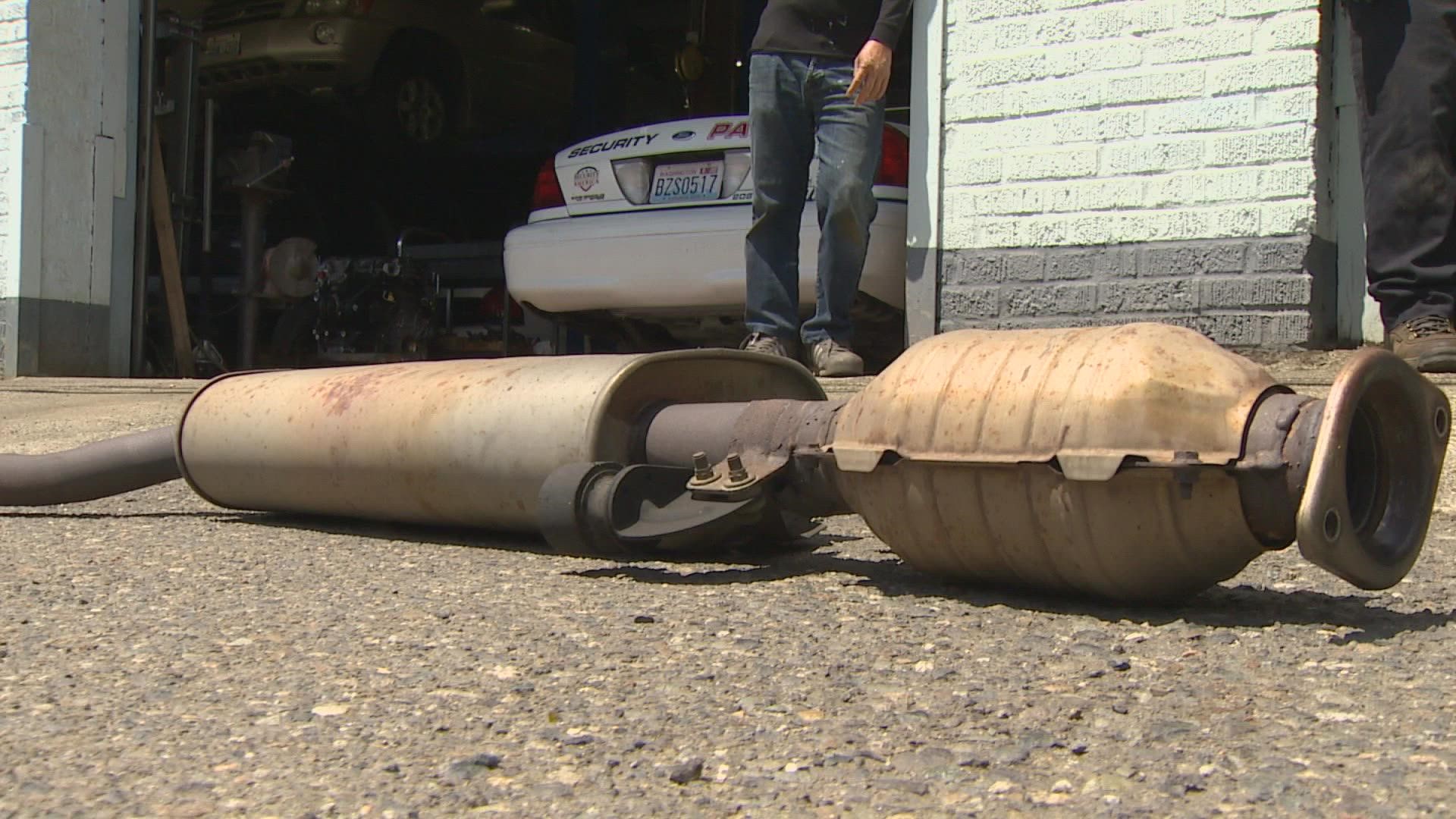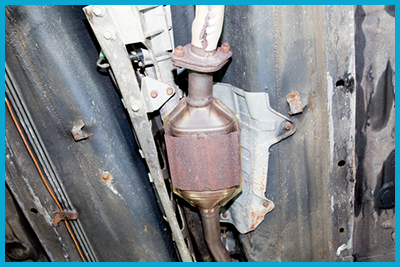Yes, selling a car without a catalytic converter is illegal due to emissions regulations. However, it is important to understand the details and exceptions within local and state laws before making any assumptions.
Not only is removing a catalytic converter against the law, but it can also result in hefty fines and consequences. Catalytic converters play a crucial role in reducing harmful emissions, so it is vital to comply with environmental regulations to protect public health and the environment.

Credit: www.king5.com
3. Is It Legal To Sell A Car Without A Catalytic Converter?
Selling a car without a catalytic converter may seem like a convenient option, especially if you’re looking to make a quick sale. However, before you proceed, it’s crucial to understand the legal implications of such a decision. In this section, we’ll explore the legality of selling a car without a catalytic converter and the potential consequences that may arise. Let’s dive in.
3.1. Environmental Regulations
Environmental regulations play a significant role in determining the legality of selling a car without a catalytic converter. This device is an integral part of a vehicle’s exhaust system, designed to reduce harmful emissions and minimize air pollution. Removing or selling a car without a catalytic converter can contribute to increased air pollution and environmental damage.
3.2. Legal Requirements For Vehicle Emissions
When it comes to the legality of selling a car without a catalytic converter, it’s essential to consider the legal requirements for vehicle emissions. In many jurisdictions, there are strict guidelines and regulations in place to control and monitor vehicle emissions. These regulations aim to ensure that vehicles meet specific emission standards to minimize their impact on air quality and public health.
To comply with legal requirements, vehicles often undergo emissions tests and inspections. Selling a car without a catalytic converter may result in the vehicle failing emissions tests, making it illegal to sell in many areas. It’s important to be aware of the specific emissions regulations and requirements in your locality before considering selling a vehicle without a catalytic converter.
3.3. Consequences Of Selling A Car Without A Catalytic Converter
Selling a car without a catalytic converter can have severe consequences, both legally and financially. Let’s explore some of the potential repercussions:
- Legal penalties: Selling a car without a catalytic converter can result in legal penalties or fines imposed by local authorities. These penalties may vary depending on the jurisdiction and its specific regulations regarding emissions control.
- Difficulty obtaining a fair price: Buyers are often aware of the legal implications of purchasing a car without a catalytic converter. Therefore, selling a car without this necessary component may make it challenging to find buyers or receive a fair price for your vehicle.
- Negative impact on reputation: Engaging in illegal activities, such as selling a car without a catalytic converter, can harm your reputation as a seller. Other potential buyers may be hesitant to do business with someone who has disregarded environmental regulations.
Considering the environmental impact, legal requirements, and potential consequences, it’s crucial to make an informed decision before selling a car without a catalytic converter. To ensure compliance with local regulations and maintain ethical business practices, it’s best to consult with relevant authorities or professionals in the automotive industry.

Credit: carbrain.com
4. Why Would Someone Remove A Catalytic Converter?
Why would someone remove a catalytic converter? There are a few reasons why individuals may choose to remove this essential emission control device from their vehicle. Some of the primary motivations include:
4.1. Increased Horsepower And Performance
Removing a catalytic converter can enhance a vehicle’s performance by reducing exhaust restriction, allowing for better airflow and increased horsepower. This modification is often sought after by car enthusiasts and performance-driven individuals looking to maximize their vehicle’s power output.
4.2. Cost Savings
Catalytic converters are expensive to replace, and some individuals may opt to remove them in an attempt to avoid the high costs associated with replacement. This cost-saving approach may be appealing to those facing budget constraints or seeking to avoid a major repair bill.
4.3. Resale Value
The removal of a catalytic converter can impact a vehicle’s resale value. Some sellers may prioritize short-term benefits over long-term consequences, choosing to remove the catalytic converter to sell the precious metals it contains and recoup some of the initial investment.
5. Risks And Potential Issues With Selling A Car Without A Catalytic Converter
Removing or selling a car without a catalytic converter is a decision that comes with several risks and potential issues. It is important to consider these factors before proceeding with such a sale. Below are some of the key concerns you should be aware of:
5.1. Fines And Penalties
One of the major risks associated with selling a car without a catalytic converter is the potential for fines and penalties. In many countries and states, it is illegal to operate a vehicle without this essential emissions-control device. Removing the catalytic converter can result in hefty fines and even legal consequences.
5.2. Environmental Impact
Another important consideration when selling a car without a catalytic converter is the environmental impact. Catalytic converters play a crucial role in reducing harmful emissions released into the atmosphere. Without this device, the vehicle can emit higher levels of pollutants such as carbon monoxide, nitrogen oxide, and hydrocarbons, contributing to air pollution and harm to the environment.
5.3. Failed Vehicle Inspections
When selling a car, potential buyers often want to ensure the vehicle is in compliance with local regulations and can pass vehicle inspections. Selling a car without a catalytic converter may result in a failed inspection, making it more difficult to sell the vehicle or lowering its market value. It’s important to note that even if an inspection is not required for selling the car, prospective buyers may still request one, and the absence of a catalytic converter could be a deal-breaker.
5.4. Potential Damage To The Engine
Although it might seem tempting to sell a car without a catalytic converter for a quick profit, it’s essential to consider the potential damage it can cause to the engine. The catalytic converter plays a crucial role in reducing harmful gases and protecting the engine from contaminants. Without this component, the engine may experience increased wear and tear, decreased fuel efficiency, and other performance issues, ultimately reducing the overall reliability and lifespan of the vehicle.

Credit: www.carfax.com
7. Alternatives To Selling A Car Without A Catalytic Converter
When it comes to selling a car without a catalytic converter, there are several alternatives you can consider. Here are three possible options:
7.1. Replacing The Catalytic Converter
If you want to sell your car, but it is missing a catalytic converter, one option is to replace it. Replacing the catalytic converter can help you comply with legal regulations and make your car more attractive to potential buyers.
Pros of replacing the catalytic converter:
- Compliance with emissions regulations: Replacing the catalytic converter ensures your car meets legal requirements.
- Potential increase in value: A car with a functioning catalytic converter may have a higher resale value.
- Expanded market: With a new catalytic converter, your car becomes appealing to a wider range of buyers.
Cons of replacing the catalytic converter:
- Cost: Replacing the catalytic converter can be expensive, depending on the make and model of your car.
- Time-consuming: Finding the right converter and having it installed can take time.
7.2. Selling The Car As-is For Parts Or Scrap
If the cost of replacing the catalytic converter is prohibitive or you simply don’t want to invest in it, another option is to sell the car as-is for parts or as scrap. Some buyers specialize in purchasing cars that need repairs or are destined for the scrap yard.
Pros of selling the car as-is for parts or scrap:
- Quick and easy: Selling the car as-is can be a hassle-free way to get rid of it.
- Minimal effort: You don’t have to worry about repairs or legal compliance if you sell it for parts or scrap.
Cons of selling the car as-is for parts or scrap:
- Potential lower value: Selling the car as-is may result in a lower sale price compared to a functioning car.
- Limited buyer pool: Not all buyers are interested in purchasing non-functioning cars or buying them for parts or scrap.
7.3. Donating The Car
If you want to make a positive impact instead of selling your car, you can consider donating it. Many charitable organizations accept car donations, which can be a great way to help a cause you care about and potentially receive a tax deduction.
Pros of donating the car:
- Supporting a cause: Donating your car can help a charitable organization and make a difference.
- Tax benefits: Depending on the charity and your location, you may be eligible for a tax deduction.
- Convenience: Charitable organizations often handle the paperwork and towing, making the process easy for you.
Cons of donating the car:
- Foregoing potential profit: If you donate your car, you won’t receive any monetary compensation for it.
- Specific donation requirements: Some charities may have specific criteria for accepting donated vehicles.
Conclusion
Selling a car without a catalytic converter may not be legal in many areas due to environmental regulations. It’s crucial to understand the laws in your region before making this decision. Consulting with a professional and ensuring compliance with all relevant regulations is essential for a smooth and legal transaction.


